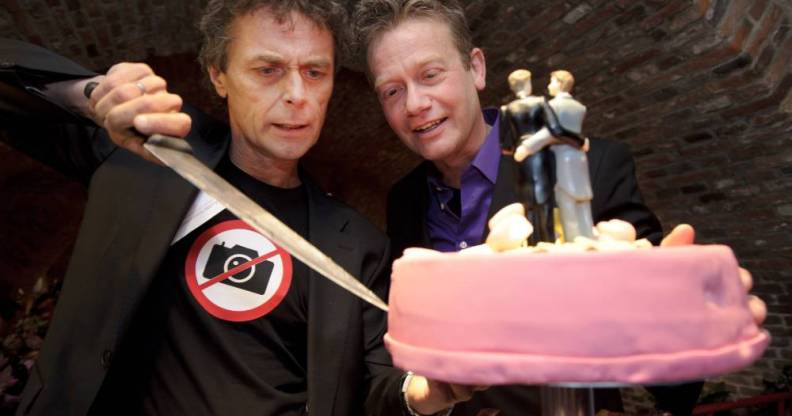The Netherlands celebrates 20 years since becoming first country to legalise same-sex marriage

Jan van Breda (L) and his partner Thijs Timmermans cut the cake after their wedding, on 1 April 2011 in Amsterdam. (Photo credit should read EVERT ELZINGA/AFP via Getty Images)
The Netherlands became the first country in the world to legalise same-sex marriage 20 years ago.
At midnight on 1 April, 2001, then-mayor Job Cohen married three gay couples and one lesbian couple in a joint ceremony at the City Hall in Amsterdam. Up until that point, same-sex couples could only enter into a registered partnership.
Since that momentous day in 2001, 20,000 same-sex couples in the Netherlands have tired the knot, according to data released by Statistics Netherlands (CBS). CBS said more than 19,000 men and nearly 21,000 women have married a same-sex partner since 1 April ,
More than 1,400 men and 1,100 women were married in the first year that same-sex marriages were legalised in the country, meaning they will be celebrating their 20th wedding anniversaries this year.
The path to marriage equality was a relatively straight-forward one for the Netherlands. In 1998, the country had enacted a law allowing same-sex couples to register their partnership, which allow couples to claim pensions, social security and inheritances. However same-sex marriage brought greater equality, and was ushered in alongside new adoption rights for queer couples.
The Dutch House of Representatives passed the same-sex marriage bill on 12 September,2000, by a vote of 109 to 33. Public debate at the tie was described at the time as “mainly symbolic”, with only a few Christian parties and smaller right-wing opponents opposing equality.
Twenty years on, the municipality of Amsterdam celebrated the tremendous anniversary on Twitter. The tweet reads: “Love wins! 20 years ago, marriage was opened to everyone in the Netherlands. The freedom to love who you want is a great asset.”
Liefde wint! 🌈 20 jaar geleden werd het huwelijk voor iedereen opengesteld in Nederland. De vrijheid om te houden van wie je wil is een groot goed. Vier deze mijlpaal met ons, en kus mee ➡️ https://t.co/xyM4C5tCye#trouwenvooriedereen pic.twitter.com/v7Mxg3N2AJ
— Gemeente Amsterdam (@AmsterdamNL) April 1, 2021
The loving message was accompanied by a series of pictures of LGBT+ couples kissing.
The European Commission also shared a tweet in memory of the Netherlands huge step towards equality in 2001. The commission added: “Today, 13 EU Countries recognise marriage to both opposite-sex and same-sex couples.
“While progress has been made, we need to do more towards LGBTIQ equality.”
20 years ago, the world’s first legal same-sex marriage took place in the Netherlands.
Today, 13 EU countries recognise marriage to both opposite-sex and same-sex couples.
While progress has been made, we need to do more towards LGBTIQ equality. #ThrowbackThursday #EU4LGBTIQ pic.twitter.com/USCzRcDLxg— European Commission (@EU_Commission) April 1, 2021
The CBS said 42 per cent of queer couples had already formalised their relationship in a registered partnership by 2001, which is an option for partners who do not wish to be legally married in the Netherlands. But the number of same-sex couples who have opted for a registered partnership has shrunk to just 3 per cent in the last five years, according to the CBS.
Though the Netherlands was the first, same-same marriage is now legal in 29 countries. Australia, Malta and Germany legalised same-sex marriage in 2017, and Taiwan made history in 2019, becoming the first government in Asia to welcome marriage equality.
Last year, Costa Rica became the first Central American country to legalise gay marriage.
But it no secret that the legalisation of same-sex marriage has not solved every issue faced by the LGBT+ community.
The fight for equality is still ongoing, and it will undoubtedly be a long battle. There are still far too many countries where LGBT+ people are condemned for just being themselves. At least 69 countries have national laws criminalising same-sex relationships between adults, according to Human Rights Watch. Additionally, nine countries have laws that criminalise transgender and gender non-conforming people.
But the strong global movement towards respect and legal recognition of the rights of LGBT+ people does give hope for the future, and the progress made over the years serves as motivation to keep the community and its allies pushing forward.

